2007 February
About Andrew Cusack
 Writer, web designer, etc.; born in New York; educated in Argentina, Scotland, and South Africa; now based in London.
Writer, web designer, etc.; born in New York; educated in Argentina, Scotland, and South Africa; now based in London. read more
News
Blogs
Reviews & Periodicals
Arts & Design
World
France
Mitteleuropa
Knickerbockers
Argentina
The Levant
Africa
Cape of Good Hope
Netherlands
Scandinavia
Québec
India
Muscovy
Germany
Academica
The Knights of Malta Ball 2007
THE MONTH OF FEBRUARY returns, and so too the Knights of Malta Ball with its requisite sojourn to Edinburgh. If I have a confession to make, it is that I am a creature of habit, and having gone the past three years, I didn’t see why the intervening distance of the Atlantic Ocean should make any particular difference this year. If I may make another confession, it is that I am incapable at organizing things competently, and of course left sorting out tickets to the last week. “Impossible,” quoth Zygmunt Sikorski-Mazur when I contacted him. “Too late I’m afraid, and there is even a waiting list of people who’ve paid up just in case tickets become available”. Well, I had accommodated myself to the concept of heading up to St Andrews and having a grand night out instead, but luckily C. came to the rescue. “Perchance,” saith the youthful Old Harrovian, “I have a spare ticket and you can have it if you wish”. Well, that settled it.
Carried off by taxicab to the Assembly Rooms in George Street from the similarly-monikered Assembly bar in Bristo Square, it was something of a disappointment to find the fine Georgian building veiled in scaffolding and lacking the usual looming Scottish standards of the Order (smaller version seen here) and the flanking flags hanging, floodlit, from the splendid façade. Nonetheless, the Assembly Rooms have been in need a fixing-up for some time now, so it’s a relief to know that the City of Edinburgh have finally coughed up the dough. Interior restorations are to follow in the coming years, but then where will the Ball during such a restoration? Ed Monckton suggested the Castle as an acceptable substitute, and I’m inclined to agree.
It was quite the enjoyable ball, as per usual. His Eminence the Cardinal Archbishop of St Andrews & Edinburgh was affable as ever. (Last year, a photo of His Eminence, Lt. Col. Bogle, Abigail, and myself at this very event made it onto the social page of Scottish Field. I hope that is as far as my life in the limelight goes!). I ran into Fra’ Freddie (Crichton-Stuart) and he exclaimed “What are you doing here!”, though he subsequently admitted that his “little spies” had, actually, informed him I would be popping over from New York. Ed Monckton shared an amusing tale of his late grandfather and the Duke of Wellington commandeering a tank to gain entry to a public house and disengaging street lamps by means of firearms. California’s own Chevalier Charles Coulombe, of course, talked to everyone, even the bouncers, who had a decidedly mafioso look to them this year. I, forgetfully, neglected to pick up a pack of Dunhills beforehand, but Gary Dench and I ran into Albert and he kindly offered his brand: an excellent, unfilitered variety of (naturally) German origin.
One of the unintended consequences of the Scottish smoking ban is an increase in socialization: a greater appreciation of the brotherly bonds of nicotine intake. Now that we of the smoking habit are forced to congregate outside entrances you have an instant bond of solidarity with complete strangers. I met an Austrian fellow named Camilo, an Edinburgh University student, and we agreed on the excellence of the Scottish system of higher education. (If one could dignify it with that term; perhaps ‘style’ is a better word than ‘system’). As it turned out, he had also spent some time in dear old Argentina, and so we swapped stories of the people and their particular ingenuity.
Later, Zygmunt introduced me to his son Nicholas, a very intelligent fellow who sounds terribly Scottish because he was educated in France rather than England with all the other Scots. (Alright, some Scots are educated in Scotland. There are Gordonstoun, Fettes, Glenalmond, and elsewhere needless to say). There were also two young Cypriot ladies, sisters if I recall correctly, who were very charming and whom we managed to drag onto the dance floor for a reel (and one of whom even managed to drag me onto the dance floor later in the evening). Typically, their names have been filed away in some deep but, alas, inaccessible fold of my brain. At any rate, we all agreed that the Turks ought to be given the boot. (Seems to be a recurring theme in European history, eh?).
Jamie Bogle was extremely late in arriving, and it turned out there was a story behind it. The trains from London were a typical shambles and there was every type of delay imaginable. Having used his mobile to make a phone call, the good Lieutenant Colonel was approached by another fellow asking if he could make a call. Jamie happened to overheard the fellow discussing “chambers” and so inquired if he (like Jamie) was a lawyer. The chap applied in the affirmative. Later in discussion, they discovered they were both actually heading to Edinburgh, and furthermore, as it turns out, to the Knights of Malta Ball! They realized they would both be terribly late, and so resigned themselves to the bar car, where they drank the train dry of champagne. The fellow’s name is Christopher Boyle, and he and his wife made for some excellent conversation, along with Amanda Crichton-Stuart, whom I singularly failed when sent to procure cigarettes for, as the few newsagents along George Street had shut by that time in the evening. I did, however, introduce her to Albert, who offered one of his cigarettes, and happily they seemed to get on well. Unhappily, the Sunday following, Albert’s Jack Russell terrier (who goes by the name of Cicio) took serious umbrage with my throwing a stick around with a female German shepherd Cicio clearly had eyes on. He ran up to me and bit me in the leg! Albert was very apologetic, and with a rolled-up newspaper and a “kommen zie here!” forced Cicio to likewise apologize. You know, as he lay prostrate before me with a teary look in his eye, I actually felt pity for the blighted creature which, only moments before, had planted its jaws on my right calf! Well, these things do happen.
On a more positive note, I actually won two prizes in the tombola raffle! A china mug bedecked with the insignia of the Sovereign Military and Hospitaller Order of Saint John of Jerusalem of Rhodes and of Malta and a placemat with an unrecognizable coat of arms emblazoned upon it. I shall have to get my heraldic detectives to work investigating the bearer of the arms; needless to say I will be quite prepared should he come for dinner.
EVENTUALLY, THE BELLS tolled and the staff encouraged us to exeunt the Assembly Rooms and we duly complied. There was then some prolonged pondering about after-parties. Zygmunt, Nicholas, and myself made a foray into the hopping Opal Lounge across the street, but I found it not to my particular liking (too loud! too crowded!) and thus decided to retire to bed. All in all a much-enjoyed evening. I congratulated Henry Lorimer on the night for having pulled it all off. “You have no idea how glad I’ll be when tomorrow comes!” was his response. Well, all the organizers deserve our thanks and appreciation. I have been to the ball four years in a row now and each time it has been excellent, though, because of the variety of parties I’ve gone with, excellent in very different ways. I wonder if I will attend next year? I hope so, as the more excuses to go to Edinburgh I have, the happier I shall be.
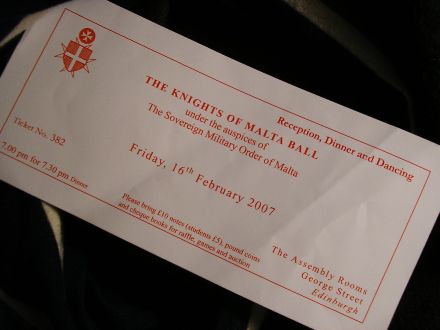
Bon Voyage
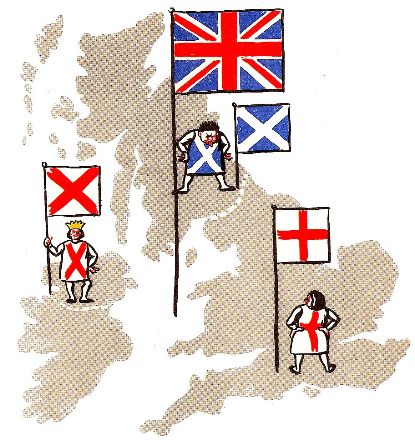
Heading to Scotland for a little bit, then down to Somerset for a spell. Dino Marcantonio, you’re in charge!
Hitchcock in Québec
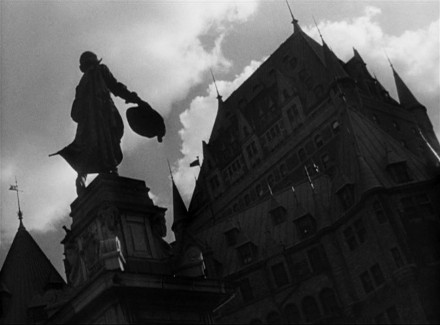
QUÉBEC, THAT STRANGE and charming province, is a most intriguing nation. It is where the British, French, and American tendencies clash and combine to form that most peculiar of all American varieties: le Québécois. Of course, since the 1960s Québec has become more French; no, not more French but more like France in that every year it plunges deeper into the depths of self-loathing: that hatred of one’s own tradition and history which has so marked out “the new Europe”. It is a race to assert one’s self by destroying any living connection to one’s past. Un jeu du fou. More’s the pity, as this once-vibrant melting pot of traditions expressed itself in interesting ways.
A splendid display of this Québec can be found in Alfred Hitchcock’s 1953 drama I Confess. The film had been recommended to me often and I finally got around to seeing it tonight. I won’t give away any of the plot, which is a good one, but Hitchcock lives up to his reputation with his excellent framing of the scenes. (Though I must admit, half of it is merely the settings in the Ville de Québec themselves). They include a peek into the Québécois Parliament. Above the Speaker’s dais is displayed not only the Sovereign’s arms, but also a crucifix, exhibiting our loyalties both temporal and spiritual. In the court room you find yet another blend of the Anglo and the French. As you no doubt recall from our handy little map, Quebec is a country with a mixed legal system. Founded as Nouvelle-France it had the civil system derived from the Romans. Captured by the British and later transformed into part of the Canadian Confederation, it has accrued layers of the Common Law so dear to we Anglos. The officials of the court wear British-style robes — the judge even has a tricorn hat — but over the jury looms a large crucifix. English government and French culture tempered by Catholic truth; not a bad mixture.
Anyhow, if you haven’t seen the film yet, here are a few snaps to enjoy until your Hitchcockian thirst is satiated. (more…)
Un Écossais en France
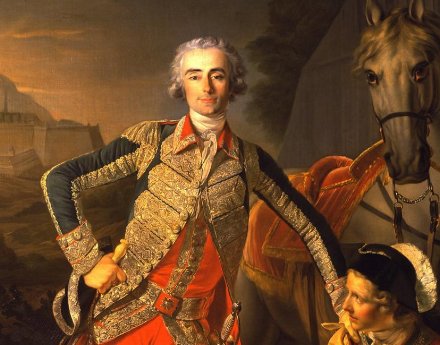
CHARLES GRANT, VICOMTE DE VAUX, was a Frenchman of Caledonian extraction who served as a sous-lieutenant in the Scots Company of the Garde du Roi, eventually rising to the rank of Lieutenant Colonel. A cadet branch of the Scottish clan, the Grants in France made sure to maintain links with their kinsmen in the old country. Abbé Peter Grant helped Sir James Grant, 8th Bt., commence an art collection while Sir James was on the Grand Tour in 1759-60. Abbé Grant’s nephew, Baron Grant de Blairfindy, was a fellow Catholic and Colonel in the Légion Royale of Louis XVI.
In a letter to Sir James, who was Chief of the Grants, Blairfindy described their fellow kinsman the Vicomte de Vaux as “a clever, brave officer, polite in company… as brave as his sword,” though, rather disappointingly, the Baron adds that the Vicomte “never drinks”. De Vaux himself took a keen interest in his extended family, and when the terrors of the French Revolution forced him into exile in London, he published there his Mémoires de la Maison Grant depicting the history of the clan. (more…)
County Confusion
The Permanent Revolution in Modern Britain
 ONE OF THE CURIOUS things about folks in Britain today is that they are not too sure about where they live. And often, when they are sure, they’re not entirely correct. I have a friend from Abingdon in England and for ages she told me that she was from Abingdon in Oxfordshire. Imagine my surprise to discover that Abingdon is not only in Berkshire, but it’s traditionally the county town of Berkshire! The trouble originates in the reforms of local government which have ensured perpetual confusion amongst the populace, and have been pretty much ongoing for the past forty years — an example of permanent revolution that would make Fidel Castro envious.
ONE OF THE CURIOUS things about folks in Britain today is that they are not too sure about where they live. And often, when they are sure, they’re not entirely correct. I have a friend from Abingdon in England and for ages she told me that she was from Abingdon in Oxfordshire. Imagine my surprise to discover that Abingdon is not only in Berkshire, but it’s traditionally the county town of Berkshire! The trouble originates in the reforms of local government which have ensured perpetual confusion amongst the populace, and have been pretty much ongoing for the past forty years — an example of permanent revolution that would make Fidel Castro envious.
The counties of England were created quite shortly after the beginning of time. The ancient sages debated voiciferously whether the Author of Creation initiated them on the eighth or the ninth day. (Curiously, the Venerable Bede is not known to have taken either position). They remained completely and utterly unchanged until the Victorians (a cohort quite bent on the idea of civic improvement) had a fiddle with them in the 1880s. From then, there were only periodic adjustment until the 1960s, when the forces of cultural revolution (the monotony monitors, as my old Latin teacher called them) demanded change in every quarter. The counties of England, sadly, did not escape their Sauronic all-seing eye.
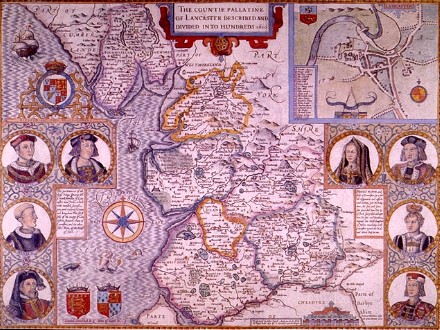
Lancashire, in better days.
The real problem which arose was that the traditional counties were, thankfully, never abolished, but that administrative units were created which often shared the same name as an historic county, but with different boundaries. Despite the fact that the county didn’t change, the movement of cities, towns, villages, hamlets, barns, and rabbit warrens between various administrative units brought much confusion as to whether a given location which was in one particular place or another. Thus the people of the previously self-governing Bootle in Lancashire found themselves merged into the metropolitan district of Sefton, which itself became part of the metropolitan ‘county’ of ‘Merseyside’. Meanwhile, the southern part of Gloucestershire and the northern part of Somerset were merged into a new ‘county’ created ex nihilo and baptised with the name of ‘Avon’. So a town could be in real Somerset but administrative Avon. All a bit maddening and confusing. (more…)
A Good Look at ‘Modern Britain’
The brilliant Mr. Peter Hitchens ruminates on the old Russian bear, and relays to us this account of the state of Britain today from the point of view of a Russian journalist:
Under its corrupt government, which is widely believed to sell seats in the upper house of parliament in return for contributions to ruling party funds, the once-free nation of Britain is rapidly turning into a police state. Pre-trial detention, once limited to 72 hours, is being repeatedly extended to far longer periods. Old rules about the accused being innocent until proved guilty are being cast aside. The right to silence has been abolished and so has the law which prevented anyone being tried twice for the same offence. The police increasingly take action against individuals for expressing opinions which defy ‘political correctness’, the official orthodoxy of the British state. The major Churches claim that new laws discriminate against their freedom of conscience.
The streets are under perpetual surveillance by closed-circuit TV cameras recording every action. The citizens are shortly to be issued with internal passports similar to Russian ones, and will be compelled to provide their fingerprints to their authorities. Schoolchildren are already being fingerprinted on such pretexts as allowing library access. The police increasingly use arrests – not followed by charges – to harass those they wish to pursue – and anyone arrested – whether convicted or not – is now compelled to give a DNA sample. As a result, Britain now has the most comprehensive DNA records of its population, anywhere in the world. Many state bodies now have the power to search people’s homes, and the old maxim that ‘An Englishman’s Home is His Castle’ is now so untrue as to be laughable.
Elections are still held, but are a sham in which all the parties have more or less the same policies. The main political movements, which have lost much of their popular support, are kept going by state subsidies and contributions from millionaire businessmen. The main state-owned broadcasting system is slavishly loyal to the government and keeps minority viewpoints off the air, or treats them with contempt and derision, while the other channels mostly purvey low-grade pornographic entertainment, so-called ‘reality’ shows of stunning banality, old movies and sport.
Meanwhile, actual crime is out of control, though citizens are legally prevented from many actions of self-defence and a government minister recently advised Britons to ‘jump up and down’ if they saw an old woman being attacked in the street, in the hope of distracting the attacker. This is the country which lectures Russia about ‘civil society’ and ‘human rights’.
Appeal to the Holy Father
From the British Isles
This appeal was recently sent to Pope Benedict XVI from a number of British intellectuals and public figures. (Source: Rorate Caeli).
In 1971 many leading British and international figures, among whose number were Yehudi Menuhin, Agatha Christie, Vladimir Ashkenazy, Nancy Mitford, Graham Greene, Joan Sutherland, and Ralph Richardson, presented a petition to His Holiness Pope Paul VI asking for the survival of the traditional Roman Catholic Mass on the grounds that it would be a serious loss to western culture. The then Archbishop of Westminster, Cardinal Heenan himself appealed to Pope Paul for the continued celebration of the traditional Mass. The full text of this appeal in 1971 was:
“If some senseless decree were to order the total or partial destruction of basilicas or cathedrals, then obviously it would be the educated – whatever their personal beliefs – who would rise up in horror to oppose such a possibility. Now the fact is that basilicas and cathedrals were built so as to celebrate a rite which, until a few months ago, constituted a living tradition. We are referring to the Roman Catholic Mass. Yet, according to the latest information in Rome, there is a plan to obliterate that Mass by the end of the current year. One of the axioms of contemporary publicity, religious as well as secular, is that modern man in general, and intellectuals in particular, have become intolerant of all forms of tradition and are anxious to suppress them and put something else in their place. But, like many other affirmations of our publicity machines, this axiom is false. Today, as in times gone by, educated people are in the vanguard where recognition of the value of tradition in concerned, and are the first to raise the alarm when it is threatened. We are not at this moment considering the religious or spiritual experience of millions of individuals. The rite in question, in its magnificent Latin text, has also inspired a host of priceless achievements in the arts – not only mystical works, but works by poets, philosophers, musicians, architects, painters and sculptors in all countries and epochs.
“Thus, it belongs to universal culture as well as to churchmen and formal Christians. In the materialistic and technocratic civilisation that is increasingly threatening the life of mind and spirit in its original creative expression – the word – it seems particularly inhuman to deprive man of word-forms in one of their most grandiose manifestations. The signatories of this appeal, which is entirely ecumenical and non-political, have been drawn from every branch of modern culture in Europe and elsewhere. They wish to call to the attention of the Holy See, the appalling responsibility it would incur in the history of the human spirit were it to refuse to allow the Traditional Mass to survive, even though this survival took place side by side with other liturgical reforms.”
This appeal in 1971 came at a crucial time in the history of civilisation when the future of the traditional Latin “Tridentine” Mass was in jeopardy. Pope Paul VI graciously acknowledged this appeal and the traditional Mass was saved, at least in England and Wales. Since this momentous appeal in 1971 the traditional Latin Mass has prospered once again among the faithful worldwide and is now celebrated in almost every country in the world. Now, in 2007, there is great hope and expectation that this treasure of civilisation will be freed from its current restrictions. We, the signatories of this petition, wish to associate ourselves to the sentiments expressed in the petition of 1971 which, perhaps, are even more valid today, and appeal to His Holiness Pope Benedict XVI in 2007 to allow the free celebration of the traditional Roman rite of Mass, the Mass of Ages, the Mass of Antiquity, on the altars of the Church.
Miss Madeleine Beard, M.Litt. (Cantab).
Dr. Mary Berry CBE, Founder of the Schola Gregoriana in Cambridge.
James Bogle, TD, MA, ACIarb, Barrister, Chairman of the Catholic Union of Great Britain.
Count Neri Capponi, Judge of the Tuscan Ecclesiastical Matrimonial Court.
Fr. Antony F.M. Conlon, Chaplain to the Latin Mass Society.
Julian Chadwick, Chairman – The Latin Mass Society of England and Wales.
Rev. Fr. Ronald Creighton-Jobe, The Oratory, London.
Fra’ Fredrik Crichton-Stuart, Chairman CIEL UK.
Leo Darroch, Secretary – International Federation Una Voce.
Adrian Davies, Barrister.
R.P. Davis, B.Phil., M.A., D.Phil (Oxon), retired senior lecturer in Ancient History, Queen’s University of Belfast; translator/commentator on the Liber Pontificalis of the Roman Church.
John Eidinow, Bodley Fellow and Dean, Merton College, Oxford.
Jonathan Evans MEP, Vice Chairman Catholic Union of Great Britain.
Fra’ Matthew Festing, OBE, TD, DL. Grand Prior of England of the Sovereign Military Order of Malta.
The Right Honourable Lord Gill, Lord Justice Clerk of Scotland.
Dr. Sheridan Gilley, Emeritus Reader, University of Durham.
Dr. Christopher Gillibrand, MA (Oxon).
Rev. Dr. Laurence Paul Hemming, Heythrop College, University of London.
Stephen Hough, Concert Pianist and Composer.
Neville Kyrke-Smith, National Director, Aid to the Church in Need UK
Prince Rupert zu Loewenstein, President of the British Association of the Sovereign Military Order of Malta. KCSG.
James MacMillan, CBE, Composer and Conductor.
Anthony McCarthy, Research Fellow, Linacre Centre for Healthcare Ethics.
Mrs. Daphne McLeod, Chairman – Pro Ecclesia et Pontifice.
Anthony Ozimic, MA (bioethics).
Dr. Susan Frank Parsons, President, Society for the Study of Christian Ethics (UK) and Co-Founder of the Society of St. Catherine of Siena.
Dr. Catherine Pickstock, Lecturer in Philosophy and Religion; Fellow – Emmanuel College, Cambridge.
Dr. Thomas Pink, Reader in Philosophy and Director of Philosophical Studies, Kings College, London.
Piers Paul Read, Novelist and Playwright; Vice-President of the Catholic Writers’ Guild of England and Wales.
The Rev’d. Dr. Alcuin Reid, Liturgical Scholar and Author.
Nicholas Richardson, Warden of Greyfriars Hall, Oxford.
Prof. Jonathan Riley-Smith, retired Dixie Professor of Ecclesiastical History, Cambridge University.
Fr. John Saward, Lisieux Senior Research Fellow in Theology, Greyfriars, Oxford University.
Dr. Joseph Shaw. Tutorial Fellow in Philosophy, St. Benet’s Hall, Oxford University.
Damien Thompson, Editor-in-Chief, The Catholic Herald.
Almodovar on Liturgy
“Ceremonies are what I enjoyed the most in my school days. I consider myself agnostic, but find Catholic liturgy absolutely wonderful, fascinating and touching. It’s been a long time since I last attended mass, though. I don’t know what it’s like these days.”
Three Cheers for Nigel Farage
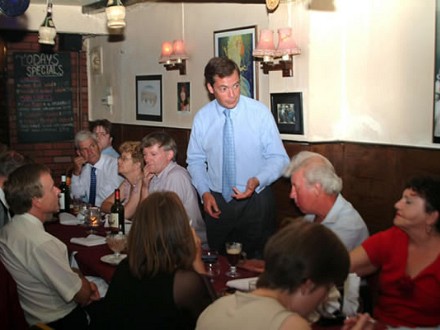
I STAND IN AWE of Nigel Farage. He is the oratorical master of the European Parliament, which, of course, doesn’t count for much since about as much attention is paid to the European Parliament as was to the Reichstag in Nazi Germany. This is despite the fact that the majority of laws passed by the Parliament of the United Kingdom are not actually initiated by British MPs, but rather rubber-stamped from Brussels on high.
If you’re asking yourself “Who is this fellow?”, then I should tell you that Farage is the somewhat-hokey leader of the United Kingdom Independence Party, the party which should get the votes of all visitors of this site. These days, one should be a Tory every day of the year except Election Day. The next general election is especially important as it must be proved to the bigwigs in the Conservative Party that Europe matters. Labour will likely win the next election anyhow (it’s even possible for the Tories to have 10% more of the popular vote but still come out with fewer seats than Labour), and the more seats that the Tories lose because just enough people voted UKIP instead of Conservative will hopefully turn the party round. (more…)
The Many Faces of R.J.E. Bradley
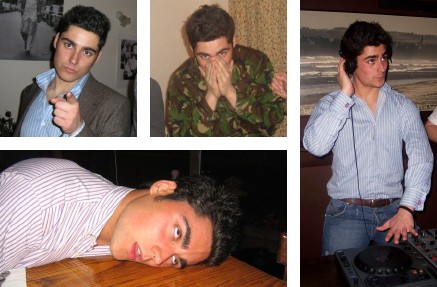
It is one of the wonders of Facebook that with a touch of the button you can find hundreds of photos of your friends. Among my compadres, none have quite the varying range of facial expressions as one R.J.E. Bradley. (Actually, you’ve met him, and his delightful parents, before, remember?). If any of you fear that 1980s-Wall-Street-style decadence has gone the way of the dodo, fear not, for Bradley keeps it alive in St Andrews. He can usually be found doing something outrageous at one of the numerous charity fashion shows, or perhaps enlivening a meeting of the Global Investment Group, or else displaying his wit in some other corner of the auld grey toon.
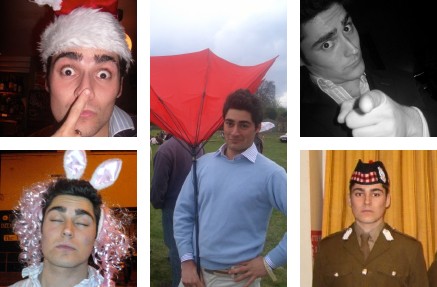
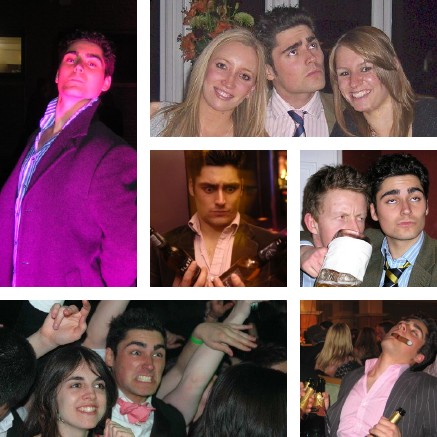
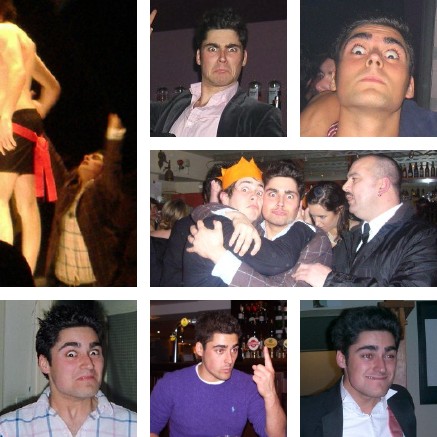
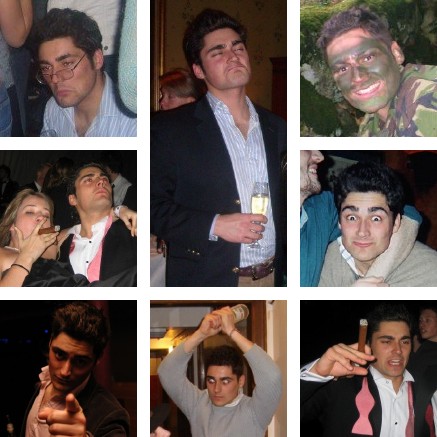
Previously: The Last Sunday
Search
Instagram: @andcusack
Click here for my Instagram photos.Most Recent Posts
- Burns Tower April 19, 2024
- Patrick in Parliament March 18, 2024
- Articles of Note: 13 March 2024 March 13, 2024
- Cambridge March 9, 2024
- Taken on Trust March 4, 2024
Most Recent Comments
Book Wishlist
Monthly Archives
Categories


